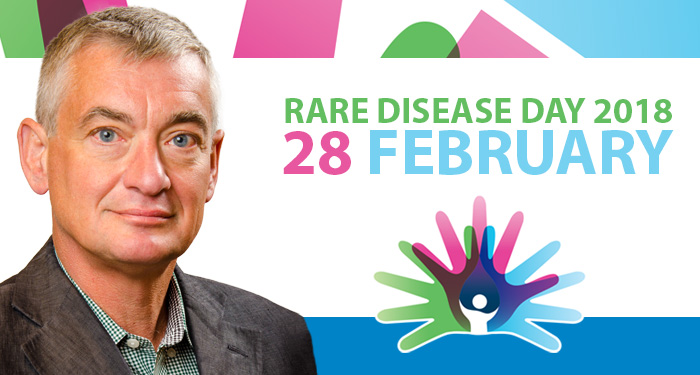Rare Disease Day 2018 - Reaffirming our commitment to research investments in this critical area
Message from Dr. Paul Lasko

Since the first Rare Disease Day was celebrated on February 29, 2008, a ‘rare’ date because it happens only once every four years, it has become an international phenomenon. Now held annually on the last day of February, this campaign builds awareness about rare diseases and how they impact millions of people worldwide, including three million – or 1 in 12 – Canadians. There are an estimated 6,000 to 8,000 rare diseases, and many affect only a small group of patients and families. Most are genetic and as a result they tend to run in families.
When it comes to research, diagnosis and treatment, collaboration is critical. With a small number of patients, the sharing of genetic data and clinical information among countries is necessary to speed scientific advances and the search for diagnostics and effective therapies.
I am pleased to say that CIHR has been at the forefront in supporting collaborative research initiatives on rare diseases in Canada and internationally. With partners such as Genome Canada and voluntary health organizations active in the area, we are contributing to the international body of knowledge to understand the genetic basis and underlying biology of rare diseases and improve diagnosis and patient care.
The Rare Diseases Models and Mechanisms Network is an example of Canadian cooperation and ingenuity. A national consortium, it connects the infrastructure and leadership of Canada's gene discovery projects with scientific communities working with model organisms such as yeast, worms, zebra fish, fruit flies, and mice.
We are working internationally as members of the European ERA-Net for Research Programmes on Rare Diseases and the Global Alliance for Genomics and Health. To enable the global sharing of data, we helped establish the Matchmaker Exchange (MME), an interconnected network of databases that enables better sharing of data, often stored in siloed datasets controlled by individual researchers, clinical laboratories, or disease-specific organizations. In addition to advancing scientific and clinical progress, the researchers involved in these initiatives are taking care to address the ethical, legal and social aspects pertaining to rare diseases.
In Canada, we are helping patients and families find high-quality curated information on diseases, existing treatments and clinical trials with our support of Orphanet-Canada, a branch of Orphanet, the world's premier online reference portal for rare diseases.
We are empowering Indigenous Peoples to break the genetic divide with the recent funding of the Silent Genome project led by researchers at the University of British Columbia. The project aims to create a database of genetic variations among Indigenous populations living in Canada and globally. This information will allow for more accurate diagnosis and treatment of Indigenous patients. All these efforts are a demonstration of our commitment to caring for Canadians affected by rare diseases. While much work has been accomplished, we know that much work remains to be done. Because of this knowledge we reaffirm our commitment to investing in research in this critical area.
I encourage you to learn more rare diseases by visiting the Rare Disease Day website.
Dr. Paul Lasko
Scientific Director
CIHR Institute of Genetics
- Date modified: